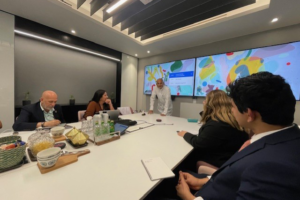Yale global affairs major Sunniva Warrington ’25 shares her experience from a trip to Qatar last fall as part of a Jackson senior capstone course.
Last fall, my Jackson school senior capstone group was assigned the task of drawing up recommendations for the next “Emerging Tech” session of the annual U.S.-Qatar Strategic Dialogue, organized by the U.S. State Department. To provide both actionable and insightful advice, my capstone team visited Doha to speak with private and public stakeholders. Our aim was to understand the condition of U.S.-Qatar cooperation on AI and tech, what previous measures have failed and succeeded, what challenges both parties have encountered, and where there might be room for future partnerships. We also hoped to gain an understanding of how U.S.-Sino rivalry impacts Qatar, given Qatar’s strategic partnership with the U.S. and strong commercial relationship with China.
On our trip, we met with Qatar’s Investment Promotion Agency, the Ministry of Interior, the U.S. Embassy in Doha, and Google Qatar — all of whom gave us critical insights to help us answer these questions. Our host and primary interlocutor throughout the visit was Eng. Khalid N Sadiq Al-Hashmi, a senior advisor to Qatar’s Minister of Communications and Information Technology who played a key role in attracting top U.S. tech firms to the country.
The Investment Promotion Agency shared with us Qatar’s long-term and phased investment plan to supplement the country’s hydrocarbon export-heavy economy with major financial and tech investments. I was incredibly impressed by the decades Qatar has spent establishing robust infrastructure and implementing strong investment incentives, such that it is an attractive destination for FDI and international start-ups. The challenge comes with selecting those initiatives that are most promising and relevant to Qatar. We spoke to the team about what they look for in international partners, about obstacles to forming these partnerships, and their focus on attracting talent through exchange programs.
A visit to the Ministry of Interior gave us insight on citizen-centric digital services implemented by the Qatari authorities, including centralized databases, ID checks, and cybersecurity systems.

From the private sector, we met with Ms. Noor Al-Sulaiti, Google Cloud’s head of security, business development, and government relations for the broader Middle East, Turkey, and Africa region. We heard from Google Cloud experts about their cybersecurity defenses throughout the region. I was surprised by the team’s extensive focus on cybersecurity, particularly in combatting cyberattacks and defending governments against cyber threats in Google Cloud’s Chronicle CyberShield. We were also keen to identify what drew Google to invest in Qatar, learning that Qatar’s established infrastructure, regulatory advantages, and the government’s role in accelerating the process were key incentives.
Finally, we had the opportunity to engage with local culture and customs by attending a traditional Qatari wedding. We participated in sword dance (Ardha), and shared a Thanksgiving dinner hosted by the Qatari Deputy Chief of Mission Ambassador Hamad Al-Muftah. We also received a guided tour of the National Museum of Qatar to learn about Qatar’s climate, wildlife, coffee culture, and pearl trade.
The trip provided us with an invaluable opportunity to engage directly with stakeholders that were key to our focus area. Candid conversations with U.S. and Qatari officials exposed gaps or blind spots in our analysis and prompted us to consider additional issues and limitations, strengthening our recommendations. The visit allowed us to serve as a link between Qatari and U.S. partners, communicating information that much of the business and policy world are too time-constrained to address. Beyond our project, it gave us a unique, firsthand perspective on U.S. and Gulf relations across corporate, strategic, and defense domains, allowing us to contribute more meaningfully to Jackson and Yale community discussions on these matters.
I was drawn to this capstone project partly because it combines my leading interests: AI, technology and the Middle East. The trip to Qatar broadened my understanding of the extent to which the Gulf is transforming into a global tech hub, attracting the upper-end of modern technologies and innovators. Conversations with both private and public stakeholders revealed the strength of U.S.-Qatari relations both diplomatically and in the corporate/industrial sphere — but also obstacles to these relationships and how mismatching perceptions of interests, objectives, and optimal solutions can hinder effective collaboration.
While some of these insights may be identifiable in research from afar, visiting the region and hearing from relevant stakeholders in person provides a stronger and off-the-book perspective that the media and online research fails to capture. The trip gave me invaluable insight into issues that I am personally and intellectually interested in. Most importantly, it allowed me to learn about Qatar’s successes, objectives, and challenges from Qataris themselves, a crucial piece that many studying the region fail to obtain.
